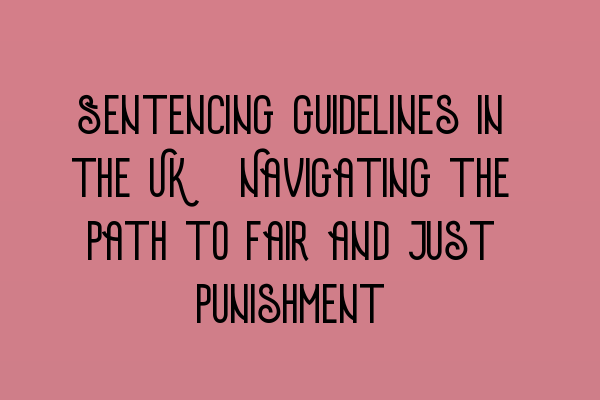Sentencing Guidelines in the UK: Navigating the Path to Fair and Just Punishment
Welcome to the SQE Criminal Law & Practice Law UK blog, where we explore various aspects of the UK legal system. In this article, we will delve into the topic of sentencing guidelines, shedding light on their importance, the factors considered in determining sentences, and how they contribute to ensuring fairness and justice in the judicial process.
Understanding Sentencing Guidelines
Sentencing guidelines play a crucial role in the criminal justice system of the United Kingdom. They provide a framework for judges and magistrates to determine the appropriate punishment for a wide range of criminal offenses. By considering various factors, these guidelines help ensure that the sentences imposed are consistent, proportionate, and fair.
When it comes to determining a sentence, judges and magistrates must take into account a multitude of factors, including the severity of the offense, the harm caused to the victim, the offender’s culpability, and any aggravating or mitigating factors. These factors, among others, are carefully evaluated to arrive at an appropriate sentence that reflects the nature of the crime and meets the objectives of punishment.
The Importance of Fair and Just Punishment
A fair and just punishment system is not only crucial for maintaining law and order but also for upholding public trust and confidence in the legal system. When people perceive punishment as arbitrary or disproportionate, it undermines public faith and can lead to a sense of injustice. Sentencing guidelines, therefore, serve as a means to promote fairness, consistency, and transparency in sentencing.
Moreover, fair and just punishment contributes to the overall deterrent effect of the criminal justice system. By imposing appropriate and proportionate sentences, the system aims to discourage individuals from engaging in criminal behavior, protecting society from harm and promoting a safer community for all.
Navigating the Sentencing Guidelines
Understanding how sentencing guidelines work can be complex, but it is essential for legal professionals and individuals involved in the criminal justice system. These guidelines provide a clear framework to assess the seriousness of offenses and apply appropriate punishments accordingly.
At SQE Criminal Law & Practice Law UK, we offer comprehensive SQE 1 preparation courses and SQE 2 preparation courses to help aspiring solicitors familiarize themselves with the intricacies of sentencing guidelines. Our expert tutors provide in-depth explanations, case studies, and practical examples to equip you with the necessary knowledge and skills to navigate the complexities of the criminal justice system.
If you are preparing for the SQE exams, it’s crucial to be well-versed in the sentencing guidelines. You can further enhance your preparation by practicing with our SQE 1 practice exam questions and SQE 1 practice mocks FLK1 FLK2. These resources will help you apply your knowledge and develop a deeper understanding of how the sentencing guidelines are practically implemented.
Stay Informed About SRA SQE Exam Dates
As you prepare for the SQE exams, it’s crucial to stay up to date with the latest information regarding exam dates and registration. The SRA SQE exam dates can be found on the official website, making it easier for you to plan your preparation and set achievable study goals.
Check out our comprehensive article on SRA SQE exam dates, where we provide a detailed overview of the exam schedule and key deadlines.
Remember, thorough preparation and a deep understanding of the sentencing guidelines can significantly contribute to your success in the SQE exams and your future legal career.
Conclusion
Sentencing guidelines are an integral part of the British legal system, playing a vital role in ensuring fairness, consistency, and transparency in the determination of appropriate punishments. By considering various factors, these guidelines help judges and magistrates make informed decisions that reflect the severity of the offense and meet the objectives of punishment.
If you are aspiring to become a solicitor, it’s crucial to familiarize yourself with the intricacies of sentencing guidelines. Our SQE 1 preparation courses and SQE 2 preparation courses can provide you with the necessary knowledge and skills to navigate the complexities of the criminal justice system and succeed in your legal career.
For additional practice and a deeper understanding of the sentencing guidelines, make use of our SQE 1 practice exam questions and SQE 1 practice mocks FLK1 FLK2. These resources will help you apply your knowledge and gain confidence in applying the sentencing guidelines.
Stay informed about the latest SRA SQE exam dates to plan your preparation effectively and create a study schedule that aligns with your goals.
Remember, understanding and applying sentencing guidelines is a fundamental skill for a successful legal career, and we are here to support you every step of the way.
